Table of Contents
ToggleFor a lot of students who have just completed their 12th Standard or are appearing for their 12th standard examination, it can be a confusing period for choosing the right career path.
With numerous professional courses to choose from, students these days are confused about courses and various career options after the 12th.
12th standard is an important turning point in a student’s life. At this juncture, they have to make crucial decisions regarding further studies and careers.
Best 40 Career Options After 12th
After completing the 12th, a student has access to numerous professional courses. These professional courses play a huge role in determining the fate of his/her career.
Here, I’ve listed down some of the main best Career options after 12th available in front of Indian students in the streams of Arts, Commerce, and Science.
Don't Know Which Career Option Is Best For YOU?
Get in Contact With our Expert Counsellors and Clear all Your Doubts.

1. Career options after 12th in Commerce:

Those students who opted for the commerce stream in school can go for careers like:
- Accountant,
- Chartered Accountant,
- Banker,
- Teacher,
- Lecturer,
- Company Secretary,
- ICWA professional,
- Lawyer,
- Manager,
- Economist,
- Statistician,
- Government employees,
- Social workers,
- Hospitality Management Professional, etc.
Students who have passed the 12th standard in Commerce stream can go for courses like BCOM, BBA, and BA (LLB).
Banking career is growing day by day. This is because they are truly the backbone of a country’s economy.
There are many vacancies in both the public and private sectors in the banking sector, it’s why banking can be a good career option after 12th for commerce students.
As banking sectors require good qualifications as well as a good educational background. A candidate needs to go through various banking examinations to get selected for the job.
Traditionally students with a commerce background automatically find themselves associated with banking as a job.
Other course students are not really ventured into it, but nowadays any student with a bachelor’s degree can get into the job thus, making it the best career option after 12th.
Read Also: BBA or B.Com, Which Is Better After 10+2?
2. Career options after 12th in Science:
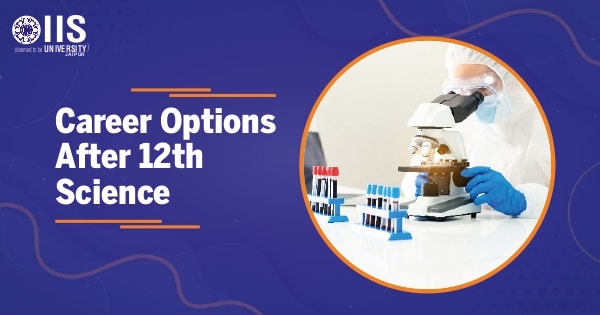
With Physics, Chemistry, and Biology as subjects in 10+2; students can take up courses such as:
- MBBS – Bachelor of Medicine and Bachelor of Surgery,
- BDS- Bachelor of Dental Surgery,
- BAMS-Bachelor of Ayurvedic Medicine and Surgery,
- B.Sc in Chemistry, Biology, Physics, Computer Science, Agriculture, Food Technology, Forensic Science, Biochemistry, Medical Technology, Microbiology, Nautical Science, Psychology, Electronics, Multimedia, Zoology, Physiotherapy, Statistics, Botany, information Technology and Medical Technology, Bachelor of Physiotherapy(BPT), B.Sc Pharma, B.Sc. Nursing etc.
Read also: List of Best B.Sc Courses: Courses Pursuing After Class 12th Science
2.1 Career options after 12th in Biotechnology:
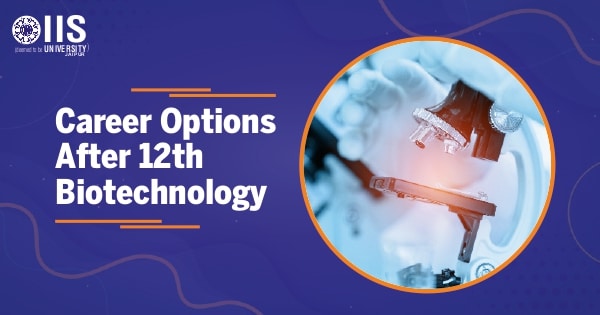
If your interest is to build a career in Biotechnology, pursuing it right after your class 12th can be a great option for you. Here are some of the options that you can choose from:
- B.Sc in Biotechnology (Molecular Biology)
- B.Sc in Bioinformatics
- B.Sc in Medical Biotechnology
- B.Tech in Chemical Engineering with Biotechnology Specialization
- B.Sc Majoring in Plant Biotechnology
- Bachelor of Biotechnology
- Bachelor of Applied Science
- Bachelor’s Degree in Resource Biotechnology
- Bachelor of Applied Science Majoring in Molecular Biotechnology
- Bachelor of Biomedicine
- Diploma in Biotechnology
- Diploma of Laboratory Technology
- Diploma of Health Science in Molecular Genetics and Biotechnology
- Diploma in Molecular Biotechnology
- B.Sc. Hons.-Data Analytics and Artificial Intelligence
There is an immense career scope in Biotechnology as you can work on creative efficient medical equipment and technologies, healthcare innovations, pharmaceutical research, and much more.
Read also: 10 Best Career Options To Choose After Graduating In Biotechnology
2.2 Career options after 12th in Chemistry:
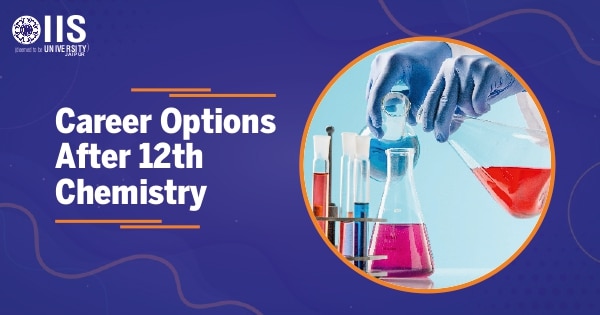
Those students with PCB or PCM stream can also opt for Chemistry as their subject. The scope of chemistry as a career option is immense in India.
Candidates can pursue degree, diploma, and certificate courses in chemistry at undergraduate (UG), postgraduate (PG), and doctoral levels.
At the degree level candidates can obtain a basic B.Sc/ M.Sc degree or B.Sc/ M.Sc honours degree in chemistry after completing 12th.
Colleges offering science courses in India have a different selection process and eligibility criteria for admission to the UG, PG, and PhD programs.
Eligibility Criteria:
Candidates are eligible to secure admission to the UG courses in chemistry if they have completed 10+2 from a recognized board with a minimum of 50% marks in the qualifying examination.
Few Colleges also conduct entrance exams for admission in B.Sc. programs. Admission to the postgraduate courses in chemistry is mostly offered through exams only.
“A basic degree in chemistry allows you to develop excellent laboratory skills but as it overlaps with specializations, it also gives you skills that are useful in other areas of science like physics, medicine, engineering, geosciences, Biochemistry, Chemical Physics, Forensic Sciences, Pharmacology, Food Technology, Toxicology, Agricultural Chemistry, Green Chemistry, etc.”
Jobs after pursuing Chemistry are:
Analytical chemist, Biotechnologist, Healthcare scientist, Forensic scientist, Nanotechnologist, Pharmacologist, Research Scientist, and Toxicologist.
2.3 Career options after 12th in Microbiology:
Microbiology is a broad discipline of biology which works with the function, structure, uses, and the existence of the microscopic organism.
The scope of Microbiology is huge now as microbiology has applications in various fields such as Pharmacy, Medicine, Clinical Research, Agriculture, Dairy Industry, Water Industry, Nanotechnology, and Chemical Technology.
There are several Bachelor’s, Master’s, and Doctoral Courses available to pursue Microbiology. The Bachelor’s degree is a three-year course comprising of Courses such as Bachelor of Science in Microbiology, Applied Microbiology, Industrial Microbiology, Food Technology, and Clinical Microbiology.
One can take admission in Bachelors Courses after passing 12th Standard with PCB subjects. Some colleges consider 50% marks in PCB subjects.
For admission to PG Courses, it is necessary to hold a Bachelors’s degree in a related field. Some colleges hold their own entrance exams for UG and PG Courses in Microbiology.
Specialization in Microbiology is like:
- Agricultural Microbiology,
- Industrial Microbiology,
- Evolutionary Microbiology,
- Nano Microbiology,
- Cellular Microbiology,
- Soil Microbiology,
- Veterinary Microbiology,
- Generation Microbiology,
- Water Microbiology,
- Pharmaceutical Microbiology,
- Microbial Genetics,
- Environmental Microbiology, and Microbial.
Microbiologists work in many different job areas, in a variety of different job roles. Microbiologists can make careers in research and non-research fields.
2.4 Career options after 12th in Psychology:
Psychology is emerging as a very popular choice in undergraduate programs by students coming from arts, science, and commerce.
“Psychology is the scientific study of the human mind and the reasons for people’s behavior. It’s not about reading minds but a discipline that includes the study of human behavior.”
It provides a set of tools and theories for understanding how humans think and learn.
To enter this sphere, one needs to have a genuine interest in human behavior and have to develop observational skills.
Eligibility Criteria:
To pursue psychology in graduation the basic requirement is to have a 10+2 level with or without Psychology as one of the subjects.
After school, candidates can opt for a Psychology Honour degree in their graduation. Psychology programs can be pursued at Undergraduate, Post Graduate, and Doctoral levels.
Specializations in Psychology:
Specializations in Psychology are:
- Clinical Psychology,
- Neuropsychology,
- Counselling Psychology,
- Organizational Behaviour,
- Industrial Psychology,
- Forensic Psychology,
- Developmental Psychology,
- Military Psychology, etc.
Job opportunities:
Job opportunities in Psychology are Researcher, Career Counsellor, Counselling Psychologist, Clinical Psychologist, Forensic Psychologist, Industrial Psychologist, Vocational Counsellor Psychology Teacher or Professor, Special Educator, Rehabilitation Psychologist, Neuropsychologist, etc.
Don't Know Which Career Option Is Best For YOU?
Get in Contact With our Expert Counsellors and Clear all Your Doubts.

2.5 Career options after 12th in Forensic Science:
While traditional careers in the science stream are top choices of students and are considered a safe bet a career in forensic science might be an exciting opportunity.
Forensic Science is an interdisciplinary branch of science that is the perfect amalgamation of the essence of all the science subjects i.e. chemistry, biology, physics, and mathematics.
It is basically used to recognize, identify, examine and testify to any and every kind of physical evidence mostly found at crime scenes.
Forensic Scientists are expected to work in a domain that is a combination of law enforcement and crime-fighting. There is a definite educational path that you can follow to become a forensic scientist.
Eligibility Criteria:
Universities across the globe are offering forensic science courses after 12th at various levels like undergraduate, graduate, and doctoral levels.
To pursue this field after 12th, one needs a Basic qualification of 10+2 with a science stream from a recognized board.
One can pursue a B.Sc in Forensic Science which is a 3-year undergraduate program or go for any other science program in their undergraduate degree and then go for an M.Sc. in Forensic Science.
Forensic Science Specialities:
Forensic Sciences comprise specialities such as
- Forensic Pathology,
- Psychiatry, Psychology,
- Pathology, Odontology,
- Forensic Medicine, and much more.
Forensic Science subjects also include Crime and Investigative Techniques, DNA Isolation, Forensic Ballistics, Questioned Documents, DNA Profiling, Forensic Biology, Forensic Photography, Forensic Psychology, Forensic Toxicology, Forensic Physics, Cyber Forensics and Law, Analytical Chemistry, Instrumental Chemistry, etc.
2.6 Careers options after 12th in PCM:
Students having PCM in 12th standard can pursue their further studies in engineering & technology, architecture, management, textile, library science, B.Plan, NDA, Indian Army Technical Entry Scheme Course, TV and Film industry-driven course, etc.
Students who have passed Class 12th in Physics, Chemistry, and Mathematics can pursue a career in the engineering field.
Candidates can opt B.Tech or B.E degree course. For this, the candidate will have to appear in JEE and state-level entrance tests for admission to engineering colleges in India.
Bachelor’s of Planning is another professional undergraduate level degree program.
B.Plan professionals play a vital role in shaping the urban environment in all aspects like socially, environmentally, and culturally and have a significant impact to influence our lives.
Admission to B.Plan program is based on the Class 12th results from CBSE or any equivalent examination.
B.Arch is a degree program that can be completed in 5 years full-time.
It is and lucrative degree program and the course focuses on various aspects like Interior design, rural and urban planning, landscape architecture, building architecture, construction management, transportation planning, etc.
Eligibility Criteria:
Candidates who have completed Class 12th in PCM and are interested in this course can apply to colleges that offer this course.
Most of the prestigious institutes take admission based on NATA or JEE Mains scorecard.
If a student has PCM and has a keen interest in computer science and its application then BCS or BCA can be the right degree course for them.
BCS is an undergraduate degree and professionals are high in demand due to the rapid growth of the IT industry.
The course can be completed in 3 years after which students find a job in the IT sector. Most of the prestigious institutes take admission on a merit basis i.e performance in class 12th.
After the completion of the BCA course, candidates can further pursue higher education like MCA MCS or MBA for career growth.
Read more: Advantages of MBA Dual Specialization Programs in India
2.7 Careers options after 12th in Radiology:
A radiographer produces radiography of patients with the help of an X-ray to find the exact medical condition of the patient.
In addition to X-rays, a radiographer also considers CT, scans, ultrasounds, and MRI for producing radiography.
The need for educated and professional radiology technologists in hospitals, clinics, and physicians’ offices is increasing continuously. The field of radiography will be continued to show higher than average job growth into the future.
Career opportunities in Radiology:
After completing your degree in this field you will become
- Radiologist (MD),
- Radiology Technologists/Radiographers,
- Radiology Technicians,
- Ultrasound Technician/ Diagnostic Medical Sonographer,
- MRI Technician,
- CT Tech/ CAT Scan Technologist/ CT Scan Technologist.
2.8 Careers options after 12th in Astronomy and Astrophysics:
Astronomers implement the principles of Mathematics and Physics to carry out research about the Universe.
They make use of telescopes and computer programs for gathering data on the characteristics of planets, moons, stars, and other objects.
Space scientists may work as faculty at universities, pursue independent research, publish papers, guide research students, teach classes, sit on academic committees, referee papers for publication, and write proposals to fund their research.
Astronomers/astrophysicists work in government/national observatories, space research agencies, planetariums, and science museums, and may also work in mass media and science communication.
Other opportunities are in government and institutions such as the Indian Space Research Organisation and DRDO (Defence Research & Development Organisation.
Astronomers may be employed by organizations and companies to design and manufacture telescopes, write software, and do many other tasks in support of space laboratories/ missions, ground-based observatories, and data processing and analysis.
Eligibility criteria to become an Astronomer:
To become an Astronomer, a PhD degree is compulsory.
Firstly the candidate would have to complete their 10+2 examination under the science stream, especially in Mathematics & Physics.
After that, one can join an undergraduate course in Astronomy or Engineering. One can join for an honors/major in Physics with Mathematics as a secondary subject.
Thereafter, one can join a postgraduate degree in Physics or Astronomy.
Specializations in Astronomy:
After completing a master’s degree, one can do specialization in astronomy leading to Ph. D.
A theoretical Research career typically involves doing a bachelor’s in Engineering or Technology or Masters’s in Physics with basic knowledge in Mathematics & Physics.
One can join Universities or Institutions for a PhD program & obtain a permanent job.
Observation Research Career is wider because students who have an engineering degree or have knowledge of computer systems & electronics are encouraged to apply for the graduation program & which allows doing an M.Sc by research before doing a PhD.
Job opportunities in Astronomy:
There’re various job opportunities exist in public and private organizations like Bhabha Atomic Research Centre (BARC), Inter-University Centre for Astronomy and Astrophysics (IUCAA), NASA, Technology Information, Forecasting, and Assessment Council (TIFAC), ISRO, NASA, etc.
2.9 Career options after 12th in Nanotechnology:
Nanotechnology is the field of science and technology of developing nanoparticles and materials that have the size within the range of nanometers.
Building small materials and machines resulting in faster and more powerful technology is Nanotechnology.
Nanotechnology consists of working on the nanoscale (the scale that can’t be seen with a light microscope due to its small size).
Nanotechnology has come to have a diverging impact on many aspects of people’s daily lives, the opportunities in this career field are growing rapidly.
Job opportunities in Nanotechnology:
There are numerous job sectors in which one can be employed such as
- Environmental observing,
- Food science including quality control and packaging,
- Forensics, Federal lab research,
- Military, and national security,
- Energy, capture, and storage,
- Electronic Industries, Material science including textiles, polymers, packaging,
- Auto and aerospace industries, Sporting goods, Biotechnology, Medical, fields and pharmaceuticals and many more areas.
Education in the field of nanotechnology is offered the at postgraduate level and doctorate level. No institution in India offers bachelor’s courses in nanotechnology.
Eligibility criteria:
Candidates holding B. Tech degree in Material science, Mechanical, Biomedical, Chemical, Biotechnology, Electronics, and Computer Science or B.Sc in Physics, Chemistry, Mathematics, and Life Sciences can apply for the postgraduate courses in nanotechnology.
For admission to postgraduate courses in nanotechnology, a candidate must have passed the B.Sc in Physics, Chemistry, Mathematics, and Life Sciences or B.Tech in Material science/Mechanical/Biomedical/Chemical/Biotechnology/Electronics / Computer Science from a recognized University.
For admission to Ph.D. programs, a candidate must have passed M. Tech in Mechanical, Chemical, Electronic, Biotechnology, Computer Science, etc., or an M. Sc in Physics, Chemistry, Material Science, Biotechnology, Computer, Science, etc.
2.10 Career options after 12th in Artificial Intelligence:
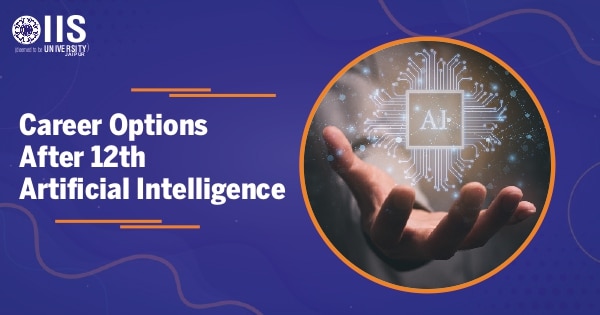
With emerging technologies such as AI and Data Science becoming the most sought-after technologies, more students are getting inclined to pursue a course in AI & Data Science specializations.
Pursuing a course in AI and Data Science not only helps the students get better career opportunities but also opens up job options in multiple sectors.
Artificial intelligence courses are related to the domain of Computer Science which focuses on developing programmed machines or computers that can function similarly to a human brain.
Where to do Courses in AI?
In India, many institutes and websites offer Artificial Intelligence Courses After 12th. Candidates would be eligible to apply for the Artificial Intelligence course after the completion of their class 12th exam.
Students can opt for AI in their B. Tech/B. E, M. Tech/M.E. They can choose AI in combination with machine learning and data science or include Artificial Intelligence certification or diploma courses as a part of the program.
Eligibility criteria:
For a certificate or diploma course in AI, a simple enrolment process would be followed for admission. Whereas, to pursue a degree course in AI, candidates will be offered admission based on JEE Main or GATE scores.
Few colleges even conduct their internal entrance tests.
Career opportunities in AI:
The scope of pursuing Artificial Intelligence Courses After 12th is immense such as
- Data Scientist,
- AI Specialist,
- Machine Learning Engineer,
- Robotics Engineer,
- Data Analyst, etc.
Read also: 10 Reasons Why Coding is Important: Importance of Coding in the future
2.11 Career options after 12th in Ethical Hacking:
The demand for Ethical Hackers is increasing in the cyber industry and required over one billion cyber security professionals in the coming two years.
Government organizations, IT security firms, financial institutes, immigration services, the aviation industry, online businesses, the hospitality industry, and the telecommunication industry are looking for Ethical Hackers to protect their digital setup.
To get started with a career in this field after the 10th standard, one should opt for the PCM (Physics, Chemistry, and Mathematics) stream with Computer Science.
Eligibility criteria:
After 12th, one can opt for B. Tech, BSC in Computer Science, BE, or IT engineering.
Many institutes offer specialized courses related to hacking also.
After graduation, one can go for post-graduation in M.Tech or MSC in Computer Science.
For Postgraduate and doctoral programs, the candidates should apply for GATE examinations if they wish to avail of scholarships as per their merit.
3. Career options after 12th in Defence:
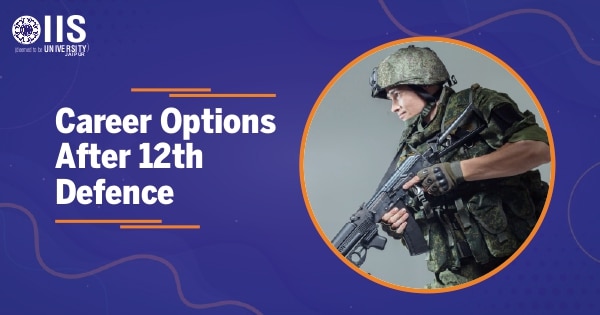
To pursue a career in Defence services there is a total of five entries in the after 12th by which one can join the Indian Armed forces as an officer or a Non-Commissioned Officer, etc.
These are National Defense Academy (NDA) Entry, Indian Air force X and Y group Airmen Entry, Navy B. Tech Entry after 12th, Indian Navy Sailor’s Entry after 12th, and Army TES entry after 12th.
The selection process of NDA includes a written exam (conducted by UPSC), SSB Interview, and Medical test.
Eligibility criteria:
Eligibility criteria for NDA are that the Candidate must have physics and mathematics in 10+2 with a minimum of 60% marks in their boards.
The age limit for candidates must be between 16.5 to 19 years old. For a career in Airforce, the candidate would be in four Phases and it is mandatory to clear each phase which is Online Test, Physical Test, Medical Test, and an All India Rank.
The Eligibility for each X and Y group is different because the X group is for the Technical group and Y is for the Non- technical group.
For Group X (Except Education Instructor Trade), the candidate must have passed 10+2 with Mathematics, Physics, and English with a minimum of 50% marks in aggregate and 50% marks in English from any recognized board or have a three years Diploma Course in Engineering in any stream.
For Group Y (Except Automobile Technician) Trades, the Candidate must have Passed Intermediate in any stream/subjects approved by Central/ State Education Boards with a minimum of 50% marks and must have scored 50% marks in English.
For entry into the Indian by Navy B. Tech Entry, there are three phases of selection.
There will be a shortlisting of the candidates based on marks scored in class JEE mains, SSB Interview, Medical Examination, etc. For the Navy, Unmarried men can apply to fill out this application form.
Age must be at least 16.5 years old. A candidate must have completed 10+2 with Physical, chemistry, mathematics, etc.
In the Indian Navy B Tech Entry Scheme, the selection is based on the merit list based on the score of JEE Mains.
Candidates are sent to Jawaharlal Nehru University for 4 years to complete the syllabus and for basic training.
For entry in the Indian Navy AA/SSR which is basically the sailors and A candidate can join the Technical and non-technical branches of the Indian Navy as a Sailors.
The Selection will be done in three phases: a Computer-based test, Physical Test, and Medical test for which the eligibility is that only Indian citizens are eligible to apply.
For the SSR, Candidates must have qualified 10+2 with physics and mathematics as compulsory subjects. For the AA, candidates must have passed 10+2 with at least 55% marks.
The candidate age should be between 17 to 20 on the day of enrollment. If one is interested in the Technical Field of the Indian Army, they can apply for this entry.
To apply for this, one must match the criteria of the Indian Army which are that, candidates would be selected based on merit, which would be made based on class 12th mark sheet.
After the submission of the application, the Indian Army team will declare the cut-off according to the 12th marks scored on the boards.
A candidate also must have appeared for JEE mains exam. Shortlisted candidates will be detailed to an undergo SSB interview.
The final merit list will be displayed on the Directorate General of Recruiting website.
The eligibility criteria for this is that only those candidates who are having physics, chemistry, and mathematics at 10+2 level can apply with a minimum of 70% marks.
The eligibility condition for calculating the PCM percentage of various state /central boards will be based on marks obtained in Class XII only.
3.1 Career options after 12th in Merchant Navy:
As opposed to the Indian Navy, which is largely involved in the defence of the nation, Merchant Navy offers commercial services and allows travelling around the globe.
The Merchant Navy, furthermore, is the backbone of international trade, carrying cargo to different countries.
Much of the important-export business around the world would come to a grinding halt without the Merchant Navy.
Eligibility criteria:
Required certificates:
The interested candidates should have held the Class 12th certificate (Mathematics, Chemistry, and Physics). They must be unmarried (male or female) and hold Indian citizenship.
Age Limit:
The candidates should be between 17 years (minimum) and 25 years (maximum). If the candidates belong to SC/ ST, there will be 5 years age relaxation (maximum ).
Eyesight vision:
Normal vision is highly sought-after. However, candidates with glasses (up to 2.5 plus/ minus) may be allowed. Candidates with color blindness will not be permitted to apply.
For a one-year Diploma Course:
The Eligibility Requirements for Merchant Navy Diploma Courses is- For One-Year Diploma Course: The candidates must have passed 10 + 2 with Physics, Chemistry and Mathematics and English (compulsory).
For Two-Year Diploma Course:
They must have passed a Diploma in Marine Engineering/ Electronics Engineering/ Electrical Engineering/ Mechanical Engineering/ Shipbuilding Engineering with 50% marks (minimum).
The eligibility requirements for Merchant Navy Bachelor Courses are that the candidates must have done Class 12th with Physics, Chemistry, and Mathematics (compulsory) with 60% of marks (minimum).
4. Career options after 12th in Home Science:
Home Science is both a science and an art-related multi-disciplinary field of study involving biology, chemistry, physics, physiology, hygiene, economics, rural development, child development, sociology and family relations, community living, art, nutrition, textiles, and home management.
One can specialize in any of the five streams of home science –
- Food and Nutrition,
- Resource Management,
- Human Development,
- Fabric, Apparel Science, and
- Communication
A career in Home Science is best suited for modern women with keen aesthetic sensibilities in contemporary arts & modern housekeeping among others.
Eligibility criteria:
To pursue a career in Home Science one way to go is to have Home Science as a subject in standard XII with science/any stream and pursue B.Sc. in Home Science for 3 years.
Another way is to study Class XII with Science/any stream (Home Science as an option) and go for B.Sc. Home Science for 3 years.
Career opportunities:
After a bachelor’s degree, one can Pursue
M.Sc. Home Science (Specializations in Food and Nutrition, Family Resource Management, Apparel, and Textile Science, Extension and Communication Management and Human Development) for 1-2 years or Pursue P.G. Diploma in Home Science for 1-2 years.
Further after completion of M.Sc. in Home Science, one can also pursue M.Phil in Home Science for 2 years or/and Ph.D. for 3-4 years.
5. Career options after 12th in Arts/Humanities:
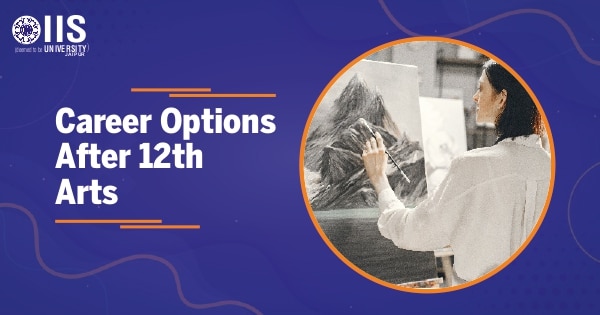
It is considered the most versatile career path, humanities, as a stream, has a storehouse of courses that one can pursue after completing their 12th.
Pursuing any of these degrees makes one adept to pursue a sensible approach to understand the varied level of humanities and thereby carve out a perfect career path.
Students of humanities or arts stream have varied options to choose from, law, literature and linguistics, sociology, psychology, political science, among many others.
A humanities student can pursue a range of B.A. courses. These courses have varied specializations which a student can choose to make a nuanced career choice.
Specializations available in B.A:
The range of specializations available in B.A. courses is such as
- B.A. (Hons.) English,
- Political Science, Sociology,
- Economics,
- Geography,
- History,
- Journalism and Mass Communication,
- Hindi and other language courses,
- Fine Arts,
- Performing Arts,
- Liberal Arts,
- Film Studies,
- Psychology,
- Social Work Philosophy
- Applied Psychology Linguistics
- Digital Media and Communication,
- B.A. Program with 2-3 subject concentrations,
- Bachelor in Culinary Arts,
- Bachelor of Social Work,
- Bachelor of Interior Design,
- Bachelor of Travel and Tourism Management,
- Bachelor of Event Management,
- Journalism and Mass Communication (BJMC),
- Bachelor of Fashion Design,
- Bachelor of Design,
- Bachelor of Design in Animation, etc.
Integrated Program in B.A:
Apart from B.A., students can also enroll in integrated courses giving them an upper hand in the job market.
An integrated program combines the curriculum of two courses wherein you are given defined classes for both degrees.
These courses considerably contribute to the efficiency of students. To get admission in an Integrated course, an aspirant must have scored 50% in the qualifying exam.
These are courses like B.A., LLB, B.B.A., LLB, B.Com., B. Lib. Sc., Bachelor of Hotel Management (B.H.M), B.Sc. Nutrition and Dietetics, B. El. Ed or Bachelor in Elementary Education.
As is evident, there is a wide option of courses available after 12th Humanities.
All these courses are career-oriented and have a wide array of opportunities in store for students of humanities to pursue after completion of their respective courses.
Read also: Best Career options after BA: Job vs Higher Studies after BA
6. Career options after 12th in Zoology:
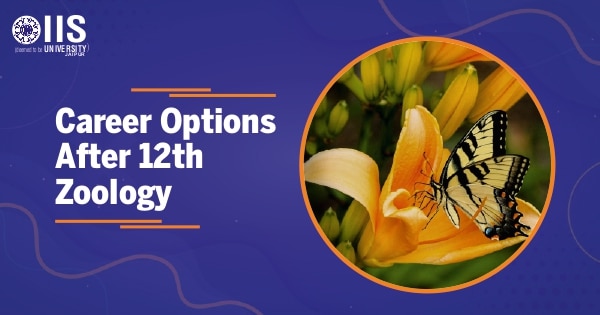
Zoology is one of the most popular branches of Science that involves the study of animals and their biological processes.
How do enrol in the Zoology course?
Zoology courses are offered at the graduate and postgraduate levels both full-time and part-time. A student can pursue B.Sc honors or elective in their under graduation if they were in the science stream in their 12th standard.
Candidates can also opt for Ph.D. in Zoology after completing their post-graduation. Candidates in this discipline are basically taught regarding animal anatomy, physiology, biochemistry, genetics, evolution, ecology, behavior, and conservation.
Career opportunities:
Career options after pursuing a B. Sc, M. Sc, and Ph.D. in Zoology are varied. Candidates find opportunities in government departments, environmental agencies, universities, colleges, biotechnological, pharmaceutical, environmental/ecological fields.
Popular specializations:
Some of the popular specializations are
- Biomedical Science,
- Ecology and Evolutionary Biology,
- Animal Behaviour and Neurobiology,
- Cell and Development Biology,
- General Zoology,
- Genetics,
- Marine Biology, etc.
Career scope:
Zoology offers immense scope to a candidate who has done master’s degree in the subject.
No one can understand animals and their behavioral pattern like Zoologists do. So they have lots of career options after the 12th.
They can work as
- Animal behaviorists,
- Conservationists,
- Wildlife biologists,
- Zoo curators,
- Wildlife Educators, Z
- oology faculty,
- Forensic experts,
- Lab technicians, and Veterinarians.
7. Career options after 12th in Geology:

Nowadays, a career in Geology is gaining a lot of popularity. It is emerging as a career that opens the doors to a plethora of opportunities for people aspiring to become Geologists.
It is the branch of science that deals with the study of the earth, its environment, history, minerals, etc.
A scientist who studies the earth’s crust to obtain an accurate picture of its structure, history, and composition is termed a Geologist.
About Geologist:
A Geologist studies the composition of the earth, assesses the natural disasters and their effects on the environment, explores areas rich in under-water resources, oil, natural gas, and minerals, and determines the quality of soil by conducting geochemical and geophysical tests.
Eligibility criteria:
The eligibility to become a geologist is to have Science Stream (Physics, Chemistry, and Mathematics) in 10+2 and then the candidate must pursue a bachelor’s degree in geology, earth sciences, or a related scientific field.
After doing graduation, a candidate can pursue a master’s in the field. However, if a candidate wishes to get admission in government colleges, then, one has to appear for the national level exams like GATE.
Some of the universities also conduct their own entrance test for admitting candidates. For higher education, candidates must have a doctoral degree (Ph.D. in Geology).
For specialized positions, such as consulting for companies in the oil industry or professorships in the Geosciences, a master’s or doctoral degree is required.
Career scope:
The employment opportunities for Geologists are very good. After getting the degree from reputed institutes/universities, one can work in private companies or consulting firms in the domestic as well as international arenas.
A geologist can also get opportunities to work in the industries related to mining, oil and gas, minerals, and water resources.
8. Career options after 12th in Literature:
The English language is widely acknowledged in both the developed and developing worlds.
The two most important components of English are English Speaking and English Writing, which have their own relevance in their respective areas.
In cases like English TV journalism, corporate communication, Management, Presentation, Knowledge sharing, etc., the importance of English speaking is much more.
How to pursue BA in English Literature?
To pursue BA English Literature, the candidate should have done their class 12th from a recognized board in any stream and should have secured a minimum of 50% to be eligible.
How to pursue MA in English Linguistics?
To pursue MA Linguistics, students need to have done their graduation from a recognized university and should have done their BA Programme or BA (Hons) in any discipline and should have secured a minimum of 55% to be eligible.
Scope of Literature:
Scope of literature is in fields like Print media like newspapers, magazines, journals, newsletters, tabloids, and academic work.
After completing Graduation or Post Graduation in literature, well-paid jobs are on the card at both governments as well as the private sector.
Exciting jobs are on TV, Journalism, Radio, Film, drama, and Publishing. Good job options are also in print media like newspapers, magazines, journals, weekly, and newsletters.
Candidates can have jobs like TV Jobs (Anchors, Editors), Publishing jobs in Print Media (Newspaper, Magazine), Manager in Corporate Communication, Teacher and lecturer in Schools and Colleges, Writer in TV, Film, Video, Movies, Radio, etc., Author, Technical Writer Lawyer, Script Writer, and Copywriter.
One may also cash one’s talent in the private organization, especially in MNCs, BPOs, and KPOs.
9. Career options after 12th in Graphic Design:
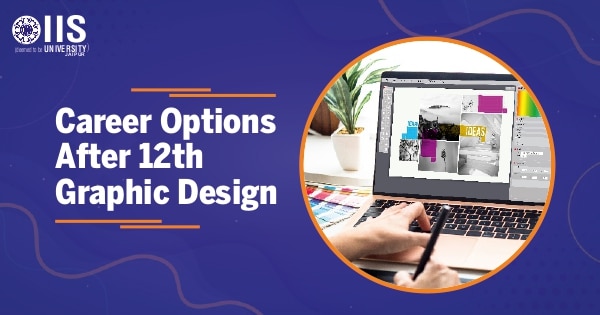
It is a profession of visual communication that combines words, images, and ideas to express information to the audience.
Graphic design is also termed Communication design & visual communication. Graphic designers create visual solutions to communications problems.
How to pursue a career in Graphic Designing?
Students who have cleared their 10+2 from any stream (Science/ Commerce/ Arts) can pursue Graphic Design courses at the graduation level.
To pursue Graphic Design courses at the PG level, a candidate should have a bachelor’s degree in design or related fields.
Undergraduate courses to pursue after 12th standard are
- B. Sc in Graphic,
- Advertising & Digital Design,
- B. A (Hons) Graphic Design,
- B. Des. Graphic Design,
- B. A (Hons) Graphic Communication Design,
- B. A Graphic Design, and Visual Communication.
- B. A (Hons) Graphic Design in Advertising and Branding etc.
Job profile in Graphic designing:
A graphic designer’s job is to use audio, video, and written materials to create special effects, animations, and creative content for the web and games.
A computer artist may be needed in an advertising agency or web production company, or they may be hired independently if the necessary skills are possessed.
Career opportunities:
Aspirants who complete a graphic design course are typically hired by Printing and publishing firms, Advertising firms, Graphic design firms, Production companies for television and multimedia, Website development firms, E-learning businesses, Web Design Firms, etc.
10. Career options after 12th in Multimedia:
B. A Multimedia or Bachelor of Arts in Multimedia is an undergraduate degree of 3 years duration, specializing in the field of multimedia and further branching out in sub-disciplines such as animation, scriptwriting, producing, and gaming visual expertise.
Who should choose a career in Multimedia?
Students who wish to expand their knowledge in varied media communication technology and want to have multiple choices in creative fields such as production and animation, as well as gaming visual experts and consultants can pursue this course for further enhancement of their creative talent.
The program primarily focuses on teaching the basic fundamental courses on design and art forms execution in a creative manner, furthermore, the course also consists of graphic design, web design as well as 3D modelling, and audio-video texturing concepts to enhance the imaginative pursuits of an individual and channelling his or her inherent talents into the creative workspace.
Multimedia careers are as varied as their related subjects and also offer many extensive career fields spanning many important industries such as gaming and animation, theatre and arts as well as corporate and commercial industries.
Career scope:
Students who wish to enrol in this program can become successful graphic and video designers, web developers, and designers as well as audio and video experts.
Students can also venture into the animation and lighting industries of filmmaking and can earn money and recognition for their respective work.
B.A in Multimedia:
B. A in Multimedia eligibility requires an intermediate degree of 10+2 from any stream as well as qualifying entrance examinations conducted by various universities and colleges to ensure a successful admission in this course program.
Career scope in Multimedia:
After completion of this program, candidates can work in online website development and management as website designers and content developers.
Such individuals are responsible for curating a site’s content and designing user-friendly website interfaces for commercial industries to build a client base with accurate marketing strategies.
Candidates can also work in the animation or design industries and provide assistance to animation firms and studios to create fun instrumental characters and designs to earn name and fame.
Aspirants can also work in the graphic designing industry and assist various related industries and disciplines in designing and developing graphics that are innovative and creative to aid their business and attract a larger customer base.
Individuals with this degree can also seek jobs in journalism and mass communication as journalists and columnists for news stations and newspapers.
Candidates can also contribute their efforts in digital media by micromanaging social media accounts of various outlets and industries and becoming influential in marketing through online media and becoming social media strategists.
Candidates can also pursue photography, cinematography, and production line to work in the glamour and entertainment industry by being leading photographers and visual experts as well as producers and scripts writers.
Read More: Latest Technologies for Web Development
11. Career options after 12th in Hotel Management:
Hotel management is one of the highly job-oriented fields; it covers a wide range of services including food service, accommodation, and catering.
Major job fields in the hospitality sector include hotels, resorts, fast food chains, restaurants, etc. A hotel management professional can be employed in any of the above-mentioned fields.
The hotel management field has always been a popular choice among students, with globalization more and more hotel industries as expanding their business to the global markets.
This has created a huge demand for hotel management professionals.
There are many courses available in the hotel management field. Candidates can choose the course as per their academic qualifications.
Courses in Hotel Management:
They can do courses like
- Diploma in Hotel Management,
- Post Graduate Diploma in Hotel Management,
- Bachelor of Hotel Management (BHM),
- Bachelor of Arts in Hotel Management,
- Bachelor of Science in Hotel Management,
- B. A (Hons) in Hotel Management,
- BBA in Hotel Management,
- Master of Science in Hotel Management,
- MBA in Hotel Management,
- Certificate Courses in Hotel and Catering Management, Craftsmanship, etc.
Eligibility criteria:
Certificate courses are generally short-term courses for the duration of 6 months to one year. Candidates can pursue it after completing the 12th standard.
For Diploma Courses, candidates must have completed 12th standard with a minimum of 40% marks and English as a compulsory subject.
For an undergraduate degree in hotel management, the candidate must be 12th passed with a minimum of 50% and have English as a compulsory subject.
After completing an undergraduate degree program, the candidate may go for a postgraduate program in Hotel Management. The basic eligibility for this program is 45% marks in graduation from a recognized university.
Admission to the various courses in hotel management is based on the hotel management entrance exam. The selection of the various courses is based on the NCHMCT JEE exam.
Job opportunities:
After completing the course there are various job opportunities for the student to work with large hotel chains including the Taj group, ITC, Oberoi hotels, Hilton group, etc.
There is a huge demand for skilled professionals in the merchant navy and cruise ships etc.
12. Career options after 12th in Law:
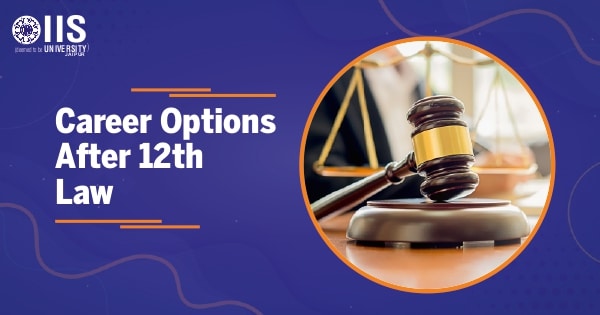
A career in law requires one to put in a lot of hard work and long working hours. The preferred specializations in law are either criminal or civil.
However, these days’ other branches are also gaining popularity such as cyber law, patent law as well as corporate law.
How to pursue Law?
To make a career in law at the UG level, aspirants can pursue five-year duration integrated LLB courses such as B. A LLB, BBA LLB, B. Sc LLB, and B.Com LLB.
Candidates can also opt to pursue a three-year LLB course after completing their graduation. Apart from this, candidates who wish to study further can obtain a master’s degree (LLM) followed by a doctoral degree (PhD).
Eligibility criteria:
The eligibility for UG Law Courses is that the candidate must have cleared Higher Secondary School/Intermediate (10+2) or its equivalent exam from a recognized board with not less than 45the % marks in aggregate.
The eligibility for PG Law Courses: For admission in LLB (3 years) course, aspirants need to be graduates from a recognized university.
Also, for admission in the LLM course candidates need to possess an LLB or equivalent degree from a recognized university.
Career scope:
After pursuing law, one can also make their law career in the job profile such as a lawyer, legal advisor, judge, solicitor, legal executive, notary public, and oath commissioner.
13. Career options after 12th in Agriculture:
Agriculture is an academic discipline of Science that involves the study of various scientific, technical, and business subjects related to agriculture, horticulture, farm management, poultry farming, dairy farming, agricultural biotechnology, etc.
The scope of a career in Agriculture has grown tremendously in recent times with cutting-edge research and continuous innovation in the industry.
Eligibility criteria:
The eligibility for UG level is that the candidates should clear class 12th in the Science stream with at least 45%-50% aggregate marks.
At the PG level, the candidates should obtain a bachelor’s degree with at least 45%-50% aggregate marks.
In India, the popular exams for agriculture are ICAR AIEEA, MCAER CET, CG PAT, and UPCATET.
How to pursue courses in Agriculture?
Students can pursue degree, diploma, and certificate agriculture courses at UG, PG, and PhD levels. Students can also pursue short-term courses after completing class 10th.
Students can study these courses in full-time, part-time, and correspondence/ distance programs.
Career scope in Agriculture:
Some of the popular agriculture job profiles are:
- Agricultural Scientist,
- Agriculture Officer,
- Production Manager,
- Food Manager,
- Food Researcher,
- Crop Specialist,
- Soil Surveyor,
- Horticulturalist,
- Water Conservationist,
- Soil Engineer,
- Soil and Plant Scientist,
- Agriculture Engineer and
- Agriculture Inspector.
14. Career options After 12th in Travel and Tourism:
Professionals working in the industry of travel and tourism are concerned with providing quality services to people who are away from home on a holiday or business.
Eligibility criteria:
The eligibility for Bachelor’s Degree Courses is that the Candidates must clear Class XII in any stream from a recognized board with a minimum aggregate percentage (usually 50% – 60%).
The eligibility criteria for Master’s Degree Courses are that the Candidates should clear graduation from a recognized institute/ university with a minimum percentage (usually 45% – 60%).
Preference for admission is usually given to candidates who have proficiency in any of the foreign languages.
The eligibility criteria for diploma courses are that the Candidates should clear Class XII from a recognized board with a minimum of 50% – 60% aggregate marks.
The Eligibility Criteria for PG Diploma Courses is that the Candidates should clear graduation from a recognized university with a minimum of 50% – 60% aggregate marks.
The eligibility criteria for Certificate Courses are that the Candidates should clear Class XII from a recognized board with at least 45% – 50% marks.
The Eligibility Criteria for Distance Learning/ Online Courses is that the Candidates must note that Travel & Tourism distance learning/ online courses are offered at all – degree,, diploma, and certificate levels.
Job profile:
Some common job profiles are holiday/travel agent, travel officer, tourist guide, transport officer, travel executive, tourism manager, tour operator, etc.
15. Career options after 12th in Event Management:
Event Management is not just limited to planning concerts or weddings but includes many other occasions like business events and conclaves, sports events, parties, reunions, festivals, etc.
The job opportunities after Event Management is that one can work with different Event Management Companies, Non-Governmental Organizations, PR firms, Hotels/Resorts, etc.
Where to pursue Event Management Courses?
Event management colleges offer full-time certificates, diplomas, UG, and PG courses to the aspirants who have completed their 12th or equivalent exam from a recognized board with a minimum aggregate of 50 %.
The candidates can opt for Event Management courses through some entrance exams like CUCET, DSAT for UG Level and CAT, MAT, and CMAT.
Main subjects of Event Management Course:
The main subjects of the event management course after the 12th are Marketing management, financial accounting, Business Economics, Event Management Planning, Event logistics, etc.
Eligibility criteria:
The Diploma, Certificate, and UG level courses can be opted by students from any stream after their 12th completion.
For post-graduation, the student must have cleared graduation from a reputed college with a minimum of 50% aggregate.
For Post-graduate Event Management courses (degree), the students are required to take entrance exams such as CAT, CMAT, and MAT and have a minimum of 50 % in their graduation from a recognized University.
Reserved categories have a relaxation of 5% at the graduation level.
16. Career options after 12th in Photography:

Photography can be described as the art and science of taking photographs and processing them. It involves equipment such as cameras, lenses, computer software (for image processing and editing), etc.
Eligibility criteria:
There are three main courses offered in India Bachelor’s Degree courses which eligibility is that the candidate must have cleared 10+2 from any stream from a recognized board.
Eligibility criteria for Diploma courses generally require a 10+2 degree from a recognized institute, whereas some also accept a 10th pass degree.
The certificate course follows the same eligibility criteria as the diploma course.
Career scope:
Some career prospects are:
- Fashion Photographer,
- Product & Commercial Photographer,
- Business & Industrial Photographer,
- Wildlife Photographer,
- Sports Photographer,
- Event Photographer (Wedding, Party, Concerts, etc.),
- Fine Art Photographer,
- Automobile Photographer,
- Photojournalist,
- Forensic Photographer.
To thrive in the field of photography, the basic set of qualities and skills which are required is a passion for photography, Creativity, will to travel and work at odd timings, Patience, Concentration, technical expertise, computer and software skills, and good communication skills.
17. Career options after 12th in Fine Arts:
The term “fine art” refers to an art form practised mainly for its aesthetic value and beauty.
Fine art is an undergraduate degree course, which deals with the study of visual and performing arts.
This degree educates the students to become artists and to follow other practices that are aligned to the making of art.
The main fine arts are film, dancing, painting, photography, architecture, pottery, conceptual art, sculpture, music, printmaking, interior design, and drama.
Job opportunities:
Today, opportunities are increasing at a rapid rate in the fine arts sector. The job prospects of a fine arts background person can be in advertising companies, magazines, television, graphic arts, teaching, theatre production, etc.
Eligibility criteria:
The eligibility for the Bachelors of Fine Arts (BFA) of Bachelors of visual arts (BVA) level course is that the candidate must have a 10+2 degree and the duration is about 4 to 5 years.
Bachelor’s in Arts (BA) in fine Arts is a three-year course. a Bachelor’s Degree in fine arts for applying at a Master’s level degree course.
For the Postgraduate Course, the Master of Fine Art (MFA) or Master in Visual Arts (MVA) is a two years duration program.
For the Master of Arts in Fine Arts (MA), the duration of this course is typically two years.
Job profile:
Some job profiles after fine arts are Art therapist Multimedia programmer, Drawing Teacher, Production Artist, Music Teacher, Creative Director, Art Director,3d Artist, Animator, etc.
18. Career options after 12th in Film Industry:
There are different features included in Filmmaking just as storytelling, direction, screenplay, cinematography, casting of actors, deciding the budget and location to shoot, etc.
Courses in Film Industry:
There are many courses available in filmmaking which is offered at different levels.
The Undergraduate Degree courses opt just after 10+2. The Master’s Degree Courses are done to take a specialization in filmmaking.
The Diploma or PG Diploma Courses are the short terms course like 6-12 months ‘duration and they can be taken as a profile building aspect in filmmaking.
Career options:
Some options can be taken after 12th in the field of filmmaking like drama, direction, production, animation, or cinematography.
Skills required for Filmmaking:
Some critical skills required in Filmmaking are good observation skills for details, creative skills for generating good ideas, problem-solving abilities, should be capable of managing time and situation as per the requirement, comfortable in new environment settings, etc.
19. Career opportunities after 12th in Stock Market:
A stock market, which is also called the share market or equity market, is the aggregation of sellers and buyers of stocks or shares who form a loose network of economic transactions and not a physical facility or discrete entity.
The equity market, or the stock market, has opened several career opportunities for individuals in recent years.
There are no hard and fast academic requirements for getting a job in the stock market in India.
Some companies prefer candidates who come from commerce or management backgrounds.
A bachelor’s or a master’s degree in business or finance can prove to be extremely helpful for this profession in some organizations.
Licensing is a must for anyone to get into this domain.
Job profile in Stock Market:
The common job profiles for the stock market are broker, sub-broker, training company, trading platform, technical analyst, portfolio manager, financial advisor, equity analyst, hedge fund manager, mutual fund manager, risk analyst, market researcher, financial advisor, etc.
20. Career options after 12th in Interior Designing:

Interior design courses are about making a space aesthetically pleasing, using several interior design software, design techniques, architectural techniques, and alike.
Students have various platforms that opt for interior designing online courses like Coursera, Skillshare, Edx, etc., and one can also apply for a diploma or a graduation degree in Interior Designing.
Eligibility criteria:
The basic eligibility for applying to this course is having 50-55% aggregate in 12th exams from a reputed school. Some of the specialization in interior designing requires math or physics as a core subject also.
Entrance exams for Interior Designing:
As part of the admission process, students need to appear for entrance exams such as NIFT, CEED, IIAD, AIEED, etc. and are also required to submit a portfolio.
The duration for the undergraduate degree in interior designing is 3 years and for the diploma in interior designing, it ranges from 1 – 2 years.
Required skills for Interior Designing:
Some basic skills required for the course are Creativity, clear design concepts, schematic design knowledge, AutoCAD, computer knowledge, sketching ability, etc.
Job profile:
The top job profiles are Interior Designer, Graphic Designer, Design Manager, Set Director, and Industrial Designer.
Want to know more: What is the Scope of Interior Designing in India?
21. Career options after 12th in Mass Communication and Journalism:
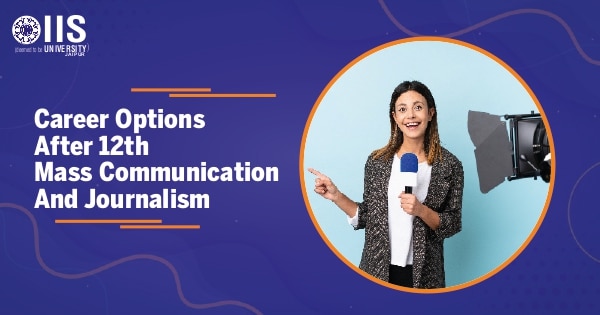
Mass communication is the process of imparting and exchanging information through mass media to large segments of the population.
The journalism profession is collecting and writing about news in newspapers and magazines or talking about it on the television or radio.
Eligibility criteria:
For applying in the course of mass communication one should clear the 12th with a minimum of 55% aggregate from a recognized board of education.
The eligibility for applying in the certificate or diploma level courses is 10+2 (in any stream) from a recognized board.
Advanced level Certificate, PG Diploma, and Masters’ Courses however can be pursued only after the completion of Graduation in any stream from science, commerce, or arts.
This means anyone can pursue the said UG/PG/PGD courses in Mass Communication without any restriction of the stream. Ph.D. in Mass Communication requires a master’ Degree in any stream with good marks.
Desired Candidates who held an Equivalent Degree/Diploma, Advanced level certificate are also eligible for the same.
Required skills for Mass Communication and Journalism:
Some basic skills required for mass communication are:
- Good communication skills,
- Presentation skills,
- Digital literacy,
- Good IT skills,
- Management skills,
- Interpersonal skills,
- Time management skills, etc.
Job profile:
The job profiles after pursuing mass communication are Radio Jockey, Fashion Photographer, Critic, Columnist and the fields in which one can go are Public Relations, News Broadcast, Media Consultant, and Reporter and can go for a Freelance job as well.
BJ (Bachelor of Journalism) is an undergraduate Mass Communication & Media course of three years’ duration.
The basic eligibility criteria for the course are completion of Class XII with a minimum of 50% marks.
Candidates having a good interest in print, electronic, and online media are apt to pursue the BJ course.
22. Career opportunity after 12th in Gaming:
Video games have become an important part of society nowadays. The gaming industry in the world is gaining popularity, with seen an increase in the number of students turning their passion and love for video games and turning it into a full-time career.
For becoming a Game Designer after 12th, one can pursue a diploma or certificate course in Gaming or a full-fledged degree in this specialization.
Eligibility criteria:
For diploma and bachelor’s degree programs, one must complete high school qualification or equivalent which is 10+2 with minimum marks specified by the university.
For master’s degrees, candidates must have a bachelor’s degree in any field (preferably science and technology specialization).
If you are planning to pursue game designing courses abroad, you will have to submit language proficiency scores of IELTS/TOEFL, etc.
Along with a Statement of Purpose (SOP) and Letters of Recommendation (LORs).
Job profile:
The job profiles after pursuing a career in gaming are:
- Game animators,
- Game artists,
- Game producers,
- Audio engineers,
- 2D and 3D Game Designer,
- Concept or Storyboard Artist,
- Programmer,
- Systems Designer,
- Graphics Designer,
- Level Designer,
- Digital Animator,
- Character Artist,
- Texture Artists,
- Creative Writer,
- Graphics Simulator, G
- ame Tester or Quality Assurance.
Also one can pursue a diploma or certificate in Game Design/Programming/Animation etc. to become an entry-level game developer after completing the 10th exam.
23. Career options after 12th in Aviation/Airlines:
The aviation industry covers a range of courses from cabin crew training to ground staff, to ticket management, to aviation training.
Students through these courses can gain an insight into the aviation industry and understand how it has become an indispensable part of human life.
Eligibility criteria:
A person can do Graduate, Postgraduate, and certificate or diploma level courses in this field.
In Graduate Degree Courses for the BBA course, it mandates that a candidate must have 50% marks in 12th.
Admission for the course is done based on a merit/cut-off list prepared based on 12th examination results. Some universities may conduct personal interviews.
For the Post Graduate Degree Courses, the candidate must have a bachelor’s degree in the same field.
For Certificate and UG Diploma Courses, the candidate must have 50% marks in the 12th class.
However, the final selection criteria for cabin crew and ground staff are only after a personal interview.
Job profile:
Some basic job profiles are air hostess or Cabin Crew Member, Airline Ticketing Agent, Airport Manager, Ground Staff Worker, Cargo Department Manager, Operations Manager, Etc.
24. Career options after 12th in Fashion Designing:
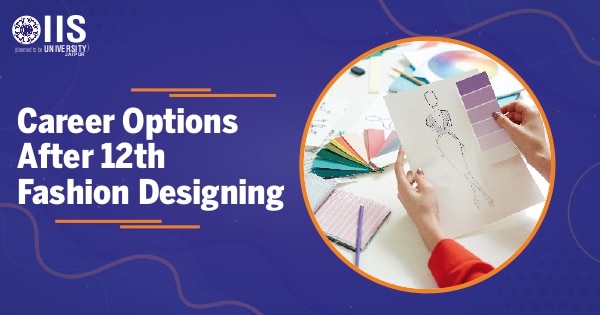
The art of fashion designing mainly focuses on the aesthetics of the fabrics and the clothing design according to the requirements of the consumers.
How you can become a Fashion Designer?
In general; to become a fashion designer, aspirants need to pursue a degree in any of the fashion designing streams.
For admissions into fashion designing courses, students must pass their 10+2 board exams with a minimum of 50% aggregate from any stream.
After a graduation degree, students can do multiple internships and apprenticeships for better job opportunities.
Students who wish to specialize in a particular field of study can opt for a post-graduation level degree.
Candidates can attain specialization at the postgraduate level, giving a more intrinsic study of fashion designing and some entrepreneurship and management concepts.
Entrance exams for Fashion Designing:
There here are entrance exams after 12th which are GAT, CAT, AIEED, NIFT, etc. The bachelor’s in Designing are a 4-year course with 10+2 clear with 50 % marks.
The BFA degree requires 10+2 with 50% aggregate and is a 3 years course. The diploma level is a 2 – 3-year degree depending on the college.
For a post-graduation degree, a candidate must require a graduate degree in the same background.
Learn more with IIS University Blogs:
12 Tips for How to Choose the Right University
Do’s and Don’ts in Campus placement Interviews
How To Prepare For Competitive Exams: 12 Exam Preparation Tips
Importance of Industrial Visits for Students
Key Benefits of Studying at the Top University in India
[cp_popup display=”inline” style_id=”694″ step_id = “1”][/cp_popup]



